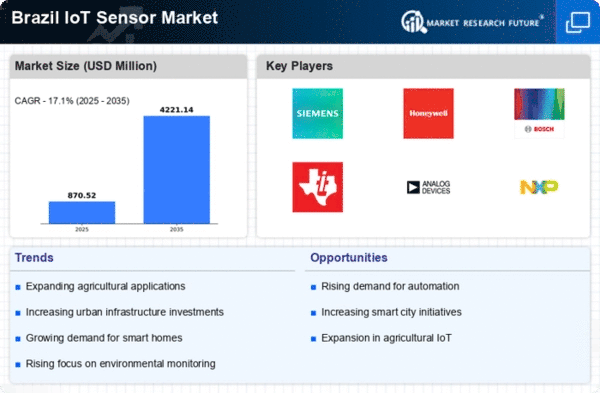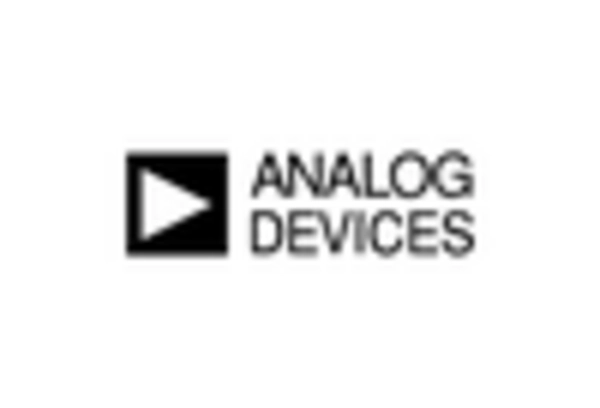Growing Focus on Energy Efficiency
The growing focus on energy efficiency in Brazil is significantly impacting the iot sensor market. As industries and consumers alike seek to reduce energy consumption and lower costs, IoT sensors are being increasingly utilized to monitor and manage energy usage. In 2025, it is estimated that the energy sector will invest around $600 million in IoT solutions aimed at enhancing energy efficiency. These sensors provide real-time data on energy consumption patterns, enabling users to identify inefficiencies and implement corrective measures. Furthermore, the Brazilian government is promoting initiatives to support renewable energy sources, which often rely on IoT technologies for monitoring and management. This trend suggests that the iot sensor market will continue to expand as energy efficiency becomes a priority for both businesses and consumers.
Rising Demand for Smart Manufacturing
The iot sensor market in Brazil is experiencing a notable surge due to the increasing demand for smart manufacturing solutions. Industries are adopting IoT technologies to enhance operational efficiency and reduce costs. In 2025, the manufacturing sector is projected to invest approximately $1.5 billion in IoT technologies, with sensors playing a crucial role in real-time monitoring and automation. This trend indicates a shift towards Industry 4.0, where interconnected devices facilitate data-driven decision-making. The integration of IoT sensors allows manufacturers to optimize production processes, minimize downtime, and improve product quality. As Brazil's industrial landscape evolves, the The IoT sensor market will benefit. from this growing emphasis on smart manufacturing, positioning itself as a key player in the digital transformation of the sector.
Increased Investment in Smart Agriculture
In Brazil, the iot sensor market is witnessing increased investment in smart agriculture, driven by the need for enhanced productivity and sustainability. Farmers are adopting IoT sensors to monitor soil conditions, crop health, and weather patterns, leading to more informed decision-making. In 2025, it is projected that investments in agricultural IoT technologies will reach $500 million, reflecting a growing recognition of the benefits of precision agriculture. These sensors enable farmers to optimize resource usage, reduce waste, and improve yields. As Brazil continues to be a major player in global agriculture, the demand for IoT solutions is likely to rise, positioning the iot sensor market as a vital component in the evolution of the agricultural sector.
Expansion of Telecommunications Infrastructure
The expansion of telecommunications infrastructure in Brazil is a critical driver for the iot sensor market. With the rollout of 5G technology, connectivity is expected to improve significantly, enabling faster data transmission and more reliable communication between devices. By 2025, it is projected that 5G coverage will reach over 50% of urban areas, facilitating the deployment of IoT applications. This enhanced connectivity is likely to lead to increased adoption of IoT sensors across various industries, including logistics, healthcare, and smart cities. The ability to transmit large volumes of data in real-time will empower businesses to make informed decisions and optimize operations. As a result, the The IoT sensor market is expected to thrive., driven by the advancements in telecommunications infrastructure.
Government Initiatives for Digital Transformation
Brazilian government initiatives aimed at digital transformation are significantly influencing the iot sensor market. The government has launched various programs to promote the adoption of IoT technologies across multiple sectors, including healthcare, agriculture, and transportation. In 2025, it is estimated that public sector investments in IoT infrastructure will reach $800 million, fostering an environment conducive to innovation. These initiatives not only enhance connectivity but also encourage collaboration between public and private sectors. The focus on developing smart cities and improving public services is likely to drive the demand for IoT sensors, as they are essential for data collection and analysis. Consequently, the iot sensor market is poised for growth, supported by favorable policies and funding from the government.














